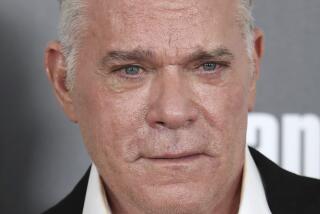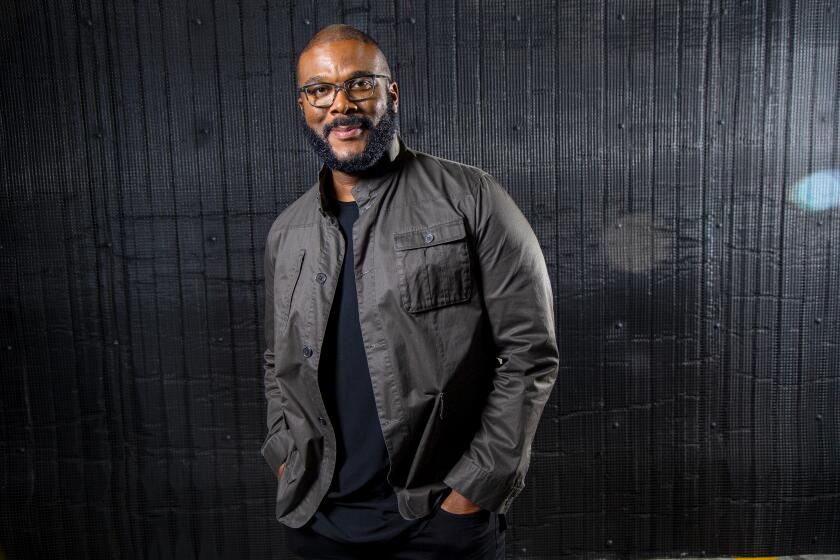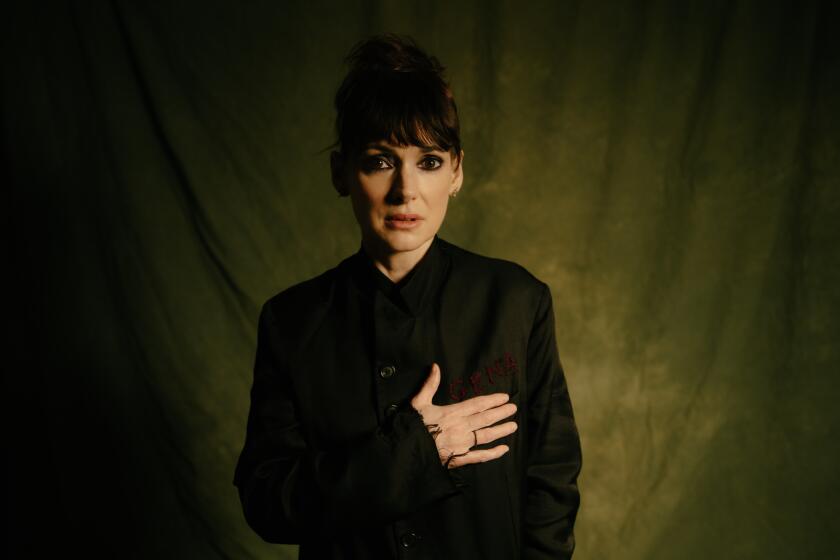In dark territory at the Toronto International Film Festival
There was no comfort zone at the Toronto International Film Festival this year: The films were edgy, and the filmmakers were even edgier — but in a completely different way. Actors took dark turns as well.
There was everyday dark, like Will Ferrell as a newly unemployed alcoholic in “Everything Must Go.” Nightmare dark, like Javier Bardem as a dying father in “Biutiful,” Nicole Kidman as a grieving mother in “Rabbit Hole” and Robin Wright as a suspected traitor in “The Conspirator.” Lights-out dark, like James Franco as a trapped hiker in “127 Hours,” and mental-institution comic-dark, like Zach Galifianakis as a psycho-guru in “It’s Kind of a Funny Story.” Then there was what I think of as kabuki dark (the darkest of them all, with Lady Gaga makeup): Natalie Portman’s torturous dancer in “Black Swan.”
Buyers — who are always afraid of dark material — were nervous and plagued by commitment issues at the start. Audiences were demanding and critical, some to the point of stony silence. “Questions for the director? Anyone? No? Well…”
Old war horses like Robert Redford and Werner Herzog, who have not engaged in this sort of in-the-trenches fighting in years, came girded for battle. (Both Redford’s gripping post-Civil War trial drama “Conspirator” and Herzog’s breathtaking 3D- documentary “Cave of Forgotten Dreams” found distributors).
Newcomers with no name at all — James Gunn? Richard Ayoade? — successfully vied for attention with industry legends in a field of roughly 300 contenders. Gunn’s subversively strange “Super,” with Rainn Wilson, sold fast and Ayoade’s sweetly smart “Submarine” is also afloat.
Publicists were pleading for attention as high-profile films with A-list actors stacked up like cordwood, showing on the same day, at the same time. Midnight madness turned into a fever, and the festival’s new staging ground, the Bell Lightbox, switched on.
It’s as if an underground rebellion had been brewing all along, and it took Toronto to unleash it. Audiences here were forced to consider emotionally and intellectually challenging fare. (Although frankly, Darren Aronofsky — the director of “Black Swan” — never fails to make me wish I had taken more psych classes in college.)
As it happens, a little humility becomes the movie business, and the Toronto festival was exhilarating and heartening as a result. Real competition, the old-fashioned kind, makes for great movies and those unexpected surprises, rough-cut gems, which absolutely charm.
“It’s Kind of a Funny Story,” from Ryan Fleck and Anna Boden — whose searing “Half Nelson” in 2006 established Ryan Gosling as a serious actor — was among my favorites. Breaking that fourth wall with the audience whenever it felt right, the film spins a whimsical coming-of-age, maybe-suicide-isn’t-the-answer, story of young love, friendship and insanity. It stars excellent newcomer Keir Gilchrist, an increasingly nuanced Galifianakis (who is speeding past any “The Hangover” limits at around 120 mph), and Emma Roberts (aunt is Julia, dad is Eric), who seems determined to become a formidable actress in her own right.
Human issues told in humane ways were everywhere. The eerie heartbreak of cloning in “Never Let Me Go” proved that the luminous Carey Mulligan, whom we first met in “An Education,” is no one-trick pony. The devastating loss of a child examined in “Rabbit Hole” wrung unforgettable performances out of Kidman and Aaron Eckhart as a couple struggling to make sense of a life defined by grief. Bardem, what can you say? He doesn’t make a false move, and in the profoundly moving sadness of “Biutiful” we discover his greatness again.
Also stunning was Colin Firth’s portrayal of a stammering British royal in the superbly calibrated “The King’s Speech.” The film premiered Sept. 10 on Firth’s 50th, with the crowd breaking into waves of “Happy Birthday” as he was introduced. The actor blushed, then took a bow. Last year, “A Single Man” got its first boost at the Toronto fest and ultimately an Oscar nomination for Firth; this year, this exceptional actor might actually win for his role as King George VI.
The purely heartwarming left audiences with puddles of tears and rafts of smiles. “The First Grader,” an exuberant true tale of a Kenyan who wants to start school at age 84, proved irresistible on multiple levels, from its fight for justice to the hunger for education regardless of age.
The heartwarming and heartbreaking meshed beautifully in “127 Hours” from Oscar-winning “Slumdog Millionaire” director Danny Boyle. The movie is something of a master class conducted by its star, James Franco, who plays a hiker trapped in a rock slide who cuts off one of his arms to escape. Most of the film unfolds in a single rock crevasse with a single character barely able to move — and yet the audience never blinks, rarely moves, barely breathes.
Agitators of the best possible sort were also on the loose. In one corner was documentarian Davis Guggenheim, whose 2006 environmental treatise “An Inconvenient Truth” won him an Oscar. He was back in fine form taking on the U.S. public education system and teacher unions in “Waiting for ‘ Superman.’”
In the opposite corner was “Cool It,” from feisty “We Live in Public” filmmaker Ondi Timoner. She was taking direct aim at Al Gore and “An Inconvenient Truth” by offering up the equally convincing and provocative contrarian academic Bjorn Lomborg. Aren’t documentaries supposed to spark spirited discussion? If so, then well done.
Overall, the documentaries offered up a rich range of voices worth listening to. “The Pipe” details a fight by Irish country folk against off-shore oil drilling by Shell, while “Windfall” carefully yet caustically questions the new wind energy craze. The especially moving and painfully insightful “Precious Life” follows a Palestinian family whose baby boy is in need of a bone marrow transplant that only Israeli doctors are equipped to perform.
Finally, there were the tales of mortality — a subject that is almost becoming a genre. Clint Eastwood, 80, went New Agey in “Hereafter,” as an ensemble of actors led by Matt Damon explored near-death and after-death experiences. Eastwood gives us a sort of altered states — but happier, more hopeful. Meanwhile, Woody Allen was unapologetic about plugging into the psychic hot line for a little fun in “You Will Meet a Tall Dark Stranger.” The 75-year-old told a packed house at the film’s premiere Sunday: If you like it great; if not, well, by then he’d be on a plane back to New York.
The morals of this festival? Filmmakers should tell the stories they’re passionate about rather than ones they think will score at the box office (and get out of Dodge before the verdict is in). Actors should take roles they’re passionate about, no matter the payday. Suits should buy what they’re afraid of, then sell the heck out of it. Audiences should speak loudly, embracing what they love and rejecting what they don’t. That’s essentially the way the movie world turned in Toronto — and what a wonderful world it was.
betsy.sharkey@latimes.com
More to Read
Only good movies
Get the Indie Focus newsletter, Mark Olsen's weekly guide to the world of cinema.
You may occasionally receive promotional content from the Los Angeles Times.











